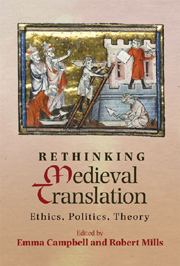Book contents
- Frontmatter
- Contents
- List of Illustrations
- List of Contributors
- Acknowledgements
- Introduction: Rethinking Medieval Translation
- 1 On Not Knowing Greek: Leonzio Pilatus's Rendition of the Iliad and the Translatio of Mediterranean Identities
- 2 Translation and Transformation in the Ovide moralisé
- 3 Translating Lucretia: Word, Image and ‘Ethical Non-Indifference’ in Simon de Hesdin's Translation of Valerius Maximus's Facta et dicta memorabilia
- 4 Translating Catharsis: Aristotle and Averroës, the Scholastics and the Basochiens
- 5 The Ethics of Translatio in Rutebeuf's Miracle de Théophile
- 6 Invisible Translation, Language Difference and the Scandal of Becket's Mother
- 7 Medieval Fixers: Politics of Interpreting in Western Historiography
- 8 The Task of the Dérimeur: Benjamin and Translation into Prose in Fifteenth-Century French Literature
- 9 The Translator as Interpretant: Passing in/on the Work of Ramon Llull
- 10 Rough Translation: Charles d'Orléans, Lydgate and Hoccleve
- 11 Bueve d'Hantone/Bovo d'Antona: Exile, Translation and the History of the Chanson de geste
- Untranslatable: A Response
- Bibliography
- Index
11 - Bueve d'Hantone/Bovo d'Antona: Exile, Translation and the History of the Chanson de geste
Published online by Cambridge University Press: 05 April 2013
- Frontmatter
- Contents
- List of Illustrations
- List of Contributors
- Acknowledgements
- Introduction: Rethinking Medieval Translation
- 1 On Not Knowing Greek: Leonzio Pilatus's Rendition of the Iliad and the Translatio of Mediterranean Identities
- 2 Translation and Transformation in the Ovide moralisé
- 3 Translating Lucretia: Word, Image and ‘Ethical Non-Indifference’ in Simon de Hesdin's Translation of Valerius Maximus's Facta et dicta memorabilia
- 4 Translating Catharsis: Aristotle and Averroës, the Scholastics and the Basochiens
- 5 The Ethics of Translatio in Rutebeuf's Miracle de Théophile
- 6 Invisible Translation, Language Difference and the Scandal of Becket's Mother
- 7 Medieval Fixers: Politics of Interpreting in Western Historiography
- 8 The Task of the Dérimeur: Benjamin and Translation into Prose in Fifteenth-Century French Literature
- 9 The Translator as Interpretant: Passing in/on the Work of Ramon Llull
- 10 Rough Translation: Charles d'Orléans, Lydgate and Hoccleve
- 11 Bueve d'Hantone/Bovo d'Antona: Exile, Translation and the History of the Chanson de geste
- Untranslatable: A Response
- Bibliography
- Index
Summary
This chapter seeks a dialogue between the chansons de geste and the modern translation theories of Antoine Berman and Lawrence Venuti, to ask questions about the ethics and politics of translation in the medieval and modern periods. Does translation enable an encounter with the ‘foreign’, or does it rather foreclose this possibility by domesticating all that is unfamiliar? Is translation an act of hospitality, a welcoming of the foreign, or is the foreign used as a commodity? Or, to put the question another way: is translation an ethical encounter with alterity, or does it seek to exploit alterity for pragmatic, political ends? I choose to focus on the chanson de geste here as it is arguably the most ‘nationalized’ medieval genre, considered quintessentially ‘French’. Putting the genre into contact with modern translation theory has the potential to free it from this nationalizing straightjacket and to reveal its ability to cross frontiers and to appeal to publics of differing tongues and persuasions. I hope, in the same movement, to integrate this popular and diverse medieval genre into contemporary debates about the practice of translation.
I start, then, from a governing assumption of much chanson de geste criticism: the idea that home of the genre is ‘France’. This categorization draws on the medieval author Jehan Bodel's division of literature into three materes – those of France, Bretagne and Rome – the first being associated with the chanson de geste.
- Type
- Chapter
- Information
- Rethinking Medieval TranslationEthics, Politics, Theory, pp. 226 - 242Publisher: Boydell & BrewerPrint publication year: 2012



